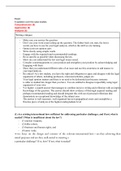Summary
Extensive Public International law Summary from 2021 (weeks 1-12) recommended for final Exam and Treaty Negotiation
- Course
- Institution
The summary contains the weekly topics which are discussed throughout the course, especially lecture notes and reading notes, as well as explanations, definitions, visuals and examples from the sessions to understand the concepts. This is the reason for the rather lengthy summary and hence covers e...
[Show more]



